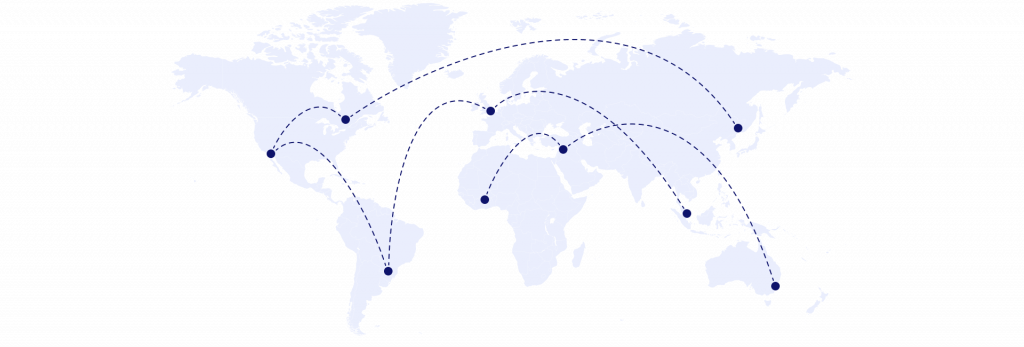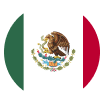Forward exchange contracts: How to lock in exchange rates for international transactions?
Last updated: 23 Jul 2025
Lock in exchange rates with forward exchange contracts and protect your profit margins. Keep reading to learn how
Key takeaways
- Forward contracts let you lock in exchange rates for a specific period of time, protecting your business from unpredictable currency fluctuations
- Fixed exchange rates through forward contracts offer a competitive advantage by enabling consistent, stable pricing
- WorldFirst offers forward contracts with up to 24 months of fixed rates, helping businesses manage international payments efficiently

For businesses that make frequent international payments, sudden currency fluctuations can affect operating profits and lead to loss of revenue. While you can’t control the currency markets and the sudden fluctuations in exchange rates, you can take measures to protect your profit margins.
One way to manage foreign exchange risks is to book a forward contract and fix an exchange rate for subsequent international transfers. Keep reading to learn how forward contracts work and why your business should consider using them.
Table of Contents
What is a forward contract?
A forward contract is an agreement where your payment provider guarantees a specific exchange rate for international transactions for a predetermined period of time.
International traders can use forward contracts to reduce uncertainty due to currency fluctuations, stabilise business cash flow and enable better financial management.
Forward transactions are customizable. Depending on your payment provider, you can set the amount, the settlement date, and specific terms to suit your needs. Some providers offer predetermined rates and durations, which you can choose to accept or negotiate. This flexibility makes forward contracts a valuable tool for businesses managing international payments and cash flow.
What are the key components of a forward contract?
There are four key components of every forward contract, which include:
Currency pair: The two currencies that will be exchanged
Contracted exchange rate: The fixed exchange rate at which the currencies will be exchanged until the end of the forward contract
Contract period: The period of time until the contract will stay valid
Terms and conditions: Any conditions, clauses, or specific requirements for settlements. The payment provider usually shares the terms and conditions in advance
What is the forward rate in a forward contract?
The forward rate is the agreed exchange rate for a currency trade that will happen in the future. It’s the price set in a forward contract, locking in the rate for the duration of the contract or when the fund limit is reached.
The forward exchange rate is determined by payment providers or banks and is influenced by the current exchange rate (spot rate). A forward contract agreement also factors in interest rate differences between two currencies, market expectations, and the duration of the contract to set the exchange rate. Since financial institutions set these rates, businesses should compare options to secure the most favourable terms.
How do forward contracts work?
Here’s how a forward contract agreement works:
- You get in touch with a bank or payment provider that supports forward contracts
- They’ll review your requirements, transaction volume and the current spot rate to offer the best possible exchange rate for the forward contract
- You enter the forward rate contract and start making international payments at a fixed exchange rate, adding more predictability to international trades
However, remember that no matter what direction the exchange rates move in, you will only get the originally agreed forward foreign exchange rates. One downside of forward contracts is missing out on potential gains if exchange rates become favourable. Though, for most customers, the certainty and stability of exchange rates outweigh the downsides of forward contracts.
Understanding margins and margin calls
To secure a forward contract, you’ll usually need to pay an initial deposit or ‘margin,’ which could be 5–10% of the total contract value. This deposit reserves your exchange rate and acts as security for the provider in case the market moves significantly before your payment date.
Why do margin calls happen?
If the market moves sharply against the forward rate you locked in, your contract could create a negative exposure for the provider. In that case, they may issue a margin call, a request for you to top up your deposit to ensure the risk remains covered.
What happens after a margin call?
If you go ahead and settle the trade as planned, both your initial deposit and any top-ups will be deducted from your final payment. However, if you have multiple open forward contracts, the provider may need to hold onto the funds to manage overall exposure.
It’s also possible to receive part or all of the margin call amount back, if the market moves in your favour again or once the contract is settled.
Types of forward exchange contracts: Fixed vs flexible
There are two main types of forward exchange contracts: fixed forward contracts and flexible (open) forward contracts.
Fixed forward contracts
A fixed forward contract locks in an exchange rate for a specific amount of foreign currency on a set future date. This means the business must complete the transaction exactly on that date, regardless of exchange rates.
This type of contract is useful for businesses with fixed payment deadlines, such as importers needing to pay for goods on a specific date or exporters expecting a payment in a foreign currency. It helps businesses plan ahead by knowing the exact cost or revenue of a future transaction.
Flexible (open) forward contract
A flexible forward contract also locks in an exchange rate for a future transaction, but instead of having a single settlement date, it allows the business to draw down funds in smaller amounts over a set period.
This is useful for companies that make regular payments in foreign currency but don’t know the exact dates in advance.
Businesses that pay international suppliers in stages or companies with fluctuating foreign expenses often prefer this type of contract. It offers protection against exchange rate fluctuations while allowing more flexibility in how and when the funds are used.
Benefits of a forward contract
Hedge against sudden currency risks
Currency markets are volatile, and foreign exchange rates can fluctuate throughout the day due to various political, economic, and regional factors. These unpredictable movements can affect your financial planning, hurt your bottom line, and lead to uncertainty in business.
Forward contracts allow you to lock in exchange rates and add some certainty to your business transactions, protecting profits and improving predictability.
Better forecasting and budgeting
When you know exactly what exchange rates you’ll get for transactions, you can budget and forecast finances better. Your business can build more accurate budget projections, anticipate costs and make better business decisions.
Improved cash flow
Fixed exchange rates for a fixed period of time can stabilise your cash flow and lead to better planning. You can better manage your capex and streamline business operations without worrying about sudden changes in exchange rates.
Competitive advantage
If you set prices without hedging against exchange rate risk, you could overcharge customers or absorb unexpected costs. Forward contracts give you stability so you can confidently price your products or services in international markets at competitive rates without constantly adjusting for currency fluctuations.
- Open 15+ local currency accounts and get paid like a local
- Pay suppliers, partners and staff worldwide in 100+ currencies
- Collect payments for free from 130+ marketplaces and payment gateways, including Amazon, Etsy, PayPal and Shopify
- Take control of spending with the World Card, a business expense card that saves you more with 1% cashback. Learn more
- Save with competitive exchange rates on currency conversions and transfers
- Lock in exchange rates for up to 24 months for cash flow certainty
Risks involved with forward exchange contracts
While forward exchange contracts help businesses manage currency risk, they also come with potential downsides. Understanding these risks can help you decide whether a forward contract is right for your business.
Commitment risk
Once you enter a forward contract, you must complete the transaction at the agreed forward contract exchange rate, even if the market rate moves in a different direction. This means you could end up paying more than the current spot rate.
Liquidity risk
A forward contract requires you to settle the transaction on the agreed date, regardless of your business’s financial position at that time. If your cash flow changes and you don’t have the necessary funds available, you could face financial strain or even penalties for non-fulfilment.
This is particularly risky for businesses with unpredictable revenue streams. If you’re expecting an international payment that gets delayed, but your forward contract still requires settlement, you may need to source funds elsewhere to meet the obligation.
Opportunity cost
Forward contracts aren’t the only way to manage currency risk; in some cases, other hedging strategies might be more suitable.
If your business operates in a highly volatile market, a mix of hedging tools, such as forward contracts, options, and natural hedging (matching currency revenues with expenses) may provide better flexibility and cost-effectiveness.
Factors to consider when booking a forward contract
Here’s what you need to keep in mind when booking a forward contract:
Exchange rate trends
Exchange rates fluctuate daily, influenced by market conditions, interest rates, and global events. While a forward contract protects you from negative movements, it also means you could miss out on a better rate if the market shifts in your favour.
- Stay informed about currency forecasts and trends
- Consider whether locking in now is the right move or if you should wait
- Speak to a forex specialist if you’re unsure—sometimes, expert insights make all the difference
Contract length
How long do you need to hedge your currency exposure? Forward contracts typically range from one month to several years, but the longer the contract, the greater the uncertainty. A longer contract offers stability, which is useful if your business has a set budget and a predictable payment schedule. A shorter contract gives you flexibility and reduces the risk of being stuck with an outdated rate. The trick is finding the right balance between risk and certainty.
Cancellation or modification
Business needs evolve, and unexpected situations arise. But forward contracts aren’t as flexible as you might hope. Once you’ve locked in a rate, you’re obligated to complete the transaction, even if you no longer need the currency or if the exchange rate moves in your favour.
- Cancelling or modifying a forward contract often comes with penalties or adjustment fees
- If your payments are unpredictable, a flexible contract can provide some leeway
- Always check your provider’s terms before committing. You don’t want any surprises later
Forward contracts vs spot contracts vs firm orders
If you make frequent international transfers, it’s necessary to understand the difference between forward contracts, firm orders and spot contracts.
Spot contracts
A spot contract is the simplest form of currency exchange. You initiate the transaction at the current exchange rate provided by your bank or payment provider, and the exchange happens immediately or within a short settlement period (usually two business days).
While many assume this is the ‘market rate,’ it’s important to note that banks and providers typically add a markup over the interbank exchange rate when initiating transactions.
A spot contract is ideal when you don’t want to wait for better rates or when exchange rate risk isn’t a major concern.
Firm orders
A firm order lets you specify the exchange rate you want. Your payment provider monitors the market, and when the rate reaches your target, they automatically execute the transaction.
You get more control over your exchange rate and don’t need to constantly check the market yourself. Though there’s also no guarantee the rate will ever be reached, meaning the transaction may not go through. Firm orders are useful if you believe the exchange rate will move in your favour but don’t have the time to monitor the markets yourself.
| Forward contracts | Spot contracts | Firm orders | |
|---|---|---|---|
| Purpose | Lock in an exchange rate for future transactions | Immediate international payments at the current market rate | Target a specific exchange rate for a future transaction |
| Exchange Rate | Fixed, agreed upon in advance | Based on the live market rate (spot rate) | Executed when the market hits your desired rate |
| Time Sensitivity | For future transactions over a set period | Immediate or near-immediate transactions | Monitors market 24/7 and executes when target rate is reached |
| Certainty | Provides predictability and stability in exchange rates | The exchange rate is determined at the time of transaction | Provides the desired rate if the market hits the target, but no guarantee |
| Flexibility | Limited; fixed rate regardless of market fluctuations | High; rate is based on current market conditions | Medium; flexible to market changes but limited to target rate |
| Process | Requires agreement with a bank or payment provider | Simple, quick transaction with rate based on current market | Requires setting up a target rate and monitoring by the provider |
| Risk | Potential to miss out on favorable market movements | Exposed to market rate fluctuations | Risk of not reaching the target rate before expiry |
| Best For | Businesses needing stability in cash flow for future payments | Individuals or businesses needing immediate currency exchange | Those with a specific rate target but without time to monitor the market |
Book a forward contract with WorldFirst
With WorldFirst, you can book a forward contract and lock in exchange rates for up to 24 months. We help SMEs secure future cross-border payment needs and protect their business from adverse foreign currency fluctuations.
Locking in an exchange rate with a forward contract means you know exactly what exchange rate you’re getting, for a set time. You can predict your cash flow to be more prepared, accurate and competitive with your planning.
If you already have a World Account, you can get in touch with your relationship manager to discuss the key terms of the forward contract which usually include:
- The currencies involved
- The rate of the contract
- Tenure (length) of the contract
- Determining whether you require a fixed, flexible, or window forward
- Initial margin requirements
If you are not ready to commit to a forward contract yet, you can also consider firm orders or spot contracts with WorldFirst to make quick, secure and reliable international payments at competitive exchange rates.
Disclaimer: The information contained is general only and largely our views. Before acting on the information you should consider whether it is appropriate for you, in light of your objectives, financial situation or needs. Although information has been obtained from and is based upon multiple sources the author believes to be reliable, we do not guarantee its accuracy and it may be incomplete or condensed. All opinions, estimates, mentioned products/services and referenced material constitute the author’s own judgement as of the date of the briefing and are subject to change without notice. WorldFirst shall not be responsible for any losses or damages arising from your reliance of such information.


Top no-fee bank accounts for businesses in Australia
Explore top no-fee business accounts in Australia for everyday banking, global payments and better control over cash flow.
Nov / 2025
The best business transaction accounts in Australia
Compare top business bank accounts in Australia and explore smarter global solutions to manage local and international payments.
Nov / 2025
Foreign transaction fee: Meaning and when it applies to you
Learn what foreign transaction fees are, when they apply and how to minimize them with effective strategies for your business.
Nov / 2025Choose a category below for more business, finance and foreign exchange support from WorldFirst.
- Almost 1,500,000 businesses have sent US$500B+ around the world with WorldFirst and its partner brands since 2004
- Your money is safeguarded with leading financial institutions





































